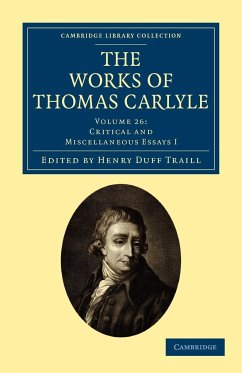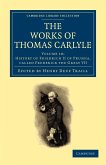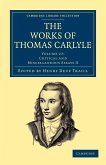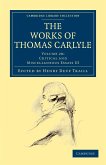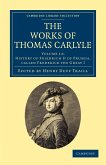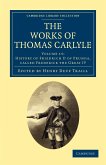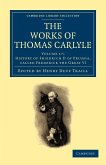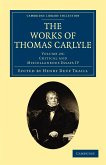- Broschiertes Buch
- Merkliste
- Auf die Merkliste
- Bewerten Bewerten
- Teilen
- Produkt teilen
- Produkterinnerung
- Produkterinnerung
The twenty-sixth volume of the Centenary Edition of Carlyle's collected works, first published in 1896.
Andere Kunden interessierten sich auch für
![The Works of Thomas Carlyle - Volume 18 The Works of Thomas Carlyle - Volume 18]() Thomas CarlyleThe Works of Thomas Carlyle - Volume 1849,99 €
Thomas CarlyleThe Works of Thomas Carlyle - Volume 1849,99 €![The Works of Thomas Carlyle - Volume 27 The Works of Thomas Carlyle - Volume 27]() Thomas CarlyleThe Works of Thomas Carlyle - Volume 2749,99 €
Thomas CarlyleThe Works of Thomas Carlyle - Volume 2749,99 €![The Works of Thomas Carlyle - Volume 28 The Works of Thomas Carlyle - Volume 28]() Thomas CarlyleThe Works of Thomas Carlyle - Volume 2849,99 €
Thomas CarlyleThe Works of Thomas Carlyle - Volume 2849,99 €![The Works of Thomas Carlyle - Volume 12 The Works of Thomas Carlyle - Volume 12]() Thomas CarlyleThe Works of Thomas Carlyle - Volume 1244,99 €
Thomas CarlyleThe Works of Thomas Carlyle - Volume 1244,99 €![The Works of Thomas Carlyle - Volume 15 The Works of Thomas Carlyle - Volume 15]() Thomas CarlyleThe Works of Thomas Carlyle - Volume 1554,99 €
Thomas CarlyleThe Works of Thomas Carlyle - Volume 1554,99 €![The Works of Thomas Carlyle - Volume 17 The Works of Thomas Carlyle - Volume 17]() Thomas CarlyleThe Works of Thomas Carlyle - Volume 1744,99 €
Thomas CarlyleThe Works of Thomas Carlyle - Volume 1744,99 €![The Works of Thomas Carlyle - Volume 29 The Works of Thomas Carlyle - Volume 29]() Thomas CarlyleThe Works of Thomas Carlyle - Volume 2949,99 €
Thomas CarlyleThe Works of Thomas Carlyle - Volume 2949,99 €-
-
-
The twenty-sixth volume of the Centenary Edition of Carlyle's collected works, first published in 1896.
Produktdetails
- Produktdetails
- Verlag: Cambridge University Press
- Seitenzahl: 532
- Erscheinungstermin: 17. September 2010
- Englisch
- Abmessung: 216mm x 140mm x 31mm
- Gewicht: 742g
- ISBN-13: 9781108022491
- ISBN-10: 1108022499
- Artikelnr.: 32470067
- Herstellerkennzeichnung
- Libri GmbH
- Europaallee 1
- 36244 Bad Hersfeld
- gpsr@libri.de
- Verlag: Cambridge University Press
- Seitenzahl: 532
- Erscheinungstermin: 17. September 2010
- Englisch
- Abmessung: 216mm x 140mm x 31mm
- Gewicht: 742g
- ISBN-13: 9781108022491
- ISBN-10: 1108022499
- Artikelnr.: 32470067
- Herstellerkennzeichnung
- Libri GmbH
- Europaallee 1
- 36244 Bad Hersfeld
- gpsr@libri.de
Thomas Carlyle was a British writer, historian, and philosopher who was born on December 4, 1795, and died on February 5, 1881. He was from the Scottish Lowlands. He was one of the most important writers of the Victorian age and had a big impact on art, literature, and philosophy in the 1800s. Born in Ecclefechan, Dumfriesshire, Scotland, Carlyle went to the University of Edinburgh and invented the Carlyle circle while there. When the arts course was over, he worked as a schoolmaster and studied to become a minister in the Burgher Church. He gave up on these and other things before he decided to write for the Edinburgh Encyclopaedia and work as a translator. Early on, he was successful by introducing little-known German literature to English readers through translations, his 1825 book Life of Friedrich Schiller, and review essays he wrote for a number of magazines. Ralph Waldo Emerson was an American essayist, speaker, philosopher, abolitionist, and poet who lived from May 25, 1803 to April 27, 1882. He went by his middle name, Waldo. He led the transcendentalist movement in the middle of the 1800s. People looked up to him as a supporter of freedom and critical thinking, as well as a wise critic of how society and conformity can make people feel bad about themselves. He was called ""the most gifted of the Americans"" by Friedrich Nietzsche, and Walt Whitman called him his ""master."" Emerson slowly moved away from the religious and social beliefs of his time. In his 1836 essay ""Nature,"" he formulated and explained the theory of transcendentalism. After this, in 1837, he gave a speech called ""The American Scholar."" Oliver Wendell Holmes Sr. thought it was America's ""intellectual Declaration of Independence.""
Introduction
1. Jean Paul Friedrich Richter
2. State of German literature
3. Life and writings of Werner
4. Goethe's Helena
Goethe
5. Burns
6. The life of Heyne
7. German playwrights
8. Voltaire
Appendix
Summary.
1. Jean Paul Friedrich Richter
2. State of German literature
3. Life and writings of Werner
4. Goethe's Helena
Goethe
5. Burns
6. The life of Heyne
7. German playwrights
8. Voltaire
Appendix
Summary.
Introduction
1. Jean Paul Friedrich Richter
2. State of German literature
3. Life and writings of Werner
4. Goethe's Helena
Goethe
5. Burns
6. The life of Heyne
7. German playwrights
8. Voltaire
Appendix
Summary.
1. Jean Paul Friedrich Richter
2. State of German literature
3. Life and writings of Werner
4. Goethe's Helena
Goethe
5. Burns
6. The life of Heyne
7. German playwrights
8. Voltaire
Appendix
Summary.

